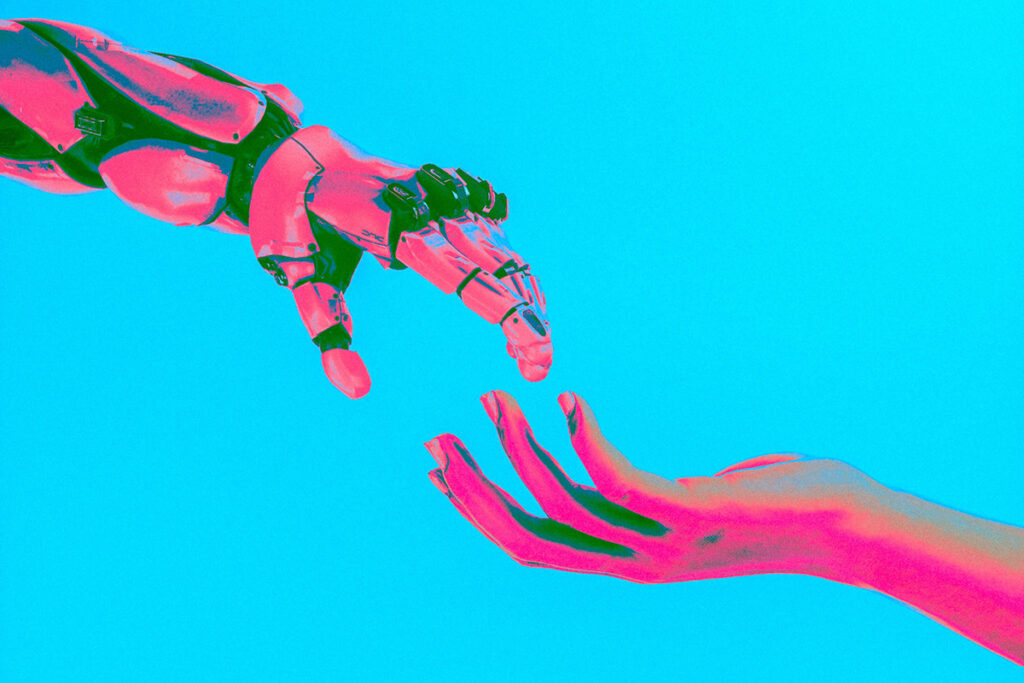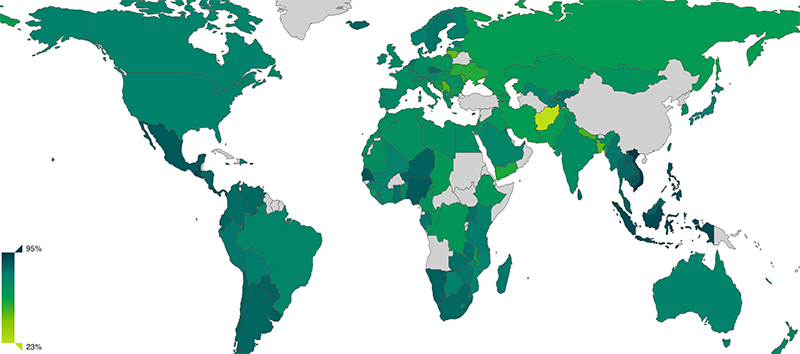Volcanoes are erupting in The Philippines, but on-fire Australia received some welcome rain. The Iran war cries have been called off and The Donald’s military powers are about to be hamstrung by the Senate. Meanwhile, his impeachment trial is starting, and we’re all on Twitter for a front-row seat.
What Could Go Right? AI everywhere
Plus, wins for pregnant women and women who don’t want to get pregnant.
This is our weekly newsletter, What Could Go Right? Sign up here to receive it in your inbox every Thursday at 6am ET. You can read past issues here.
This week we have a quick hits-style roundup of things that went right around the world under two main topics: artificial intelligence (AI) and women’s health.
Stay tuned for next week, when we’ll send out a list of the 50 animals that have been rebounding so far in 2023, including photos of the cute ones—and maybe some of the ugly ones, too.

AI everywhere
To update a line from South Park, “the robots will take yer jobs” may be the current vibe. But for what it’s worth, there are some signs that AI is different, economically speaking, than previous technologies that have increased inequality and shrunk the middle class. Time will tell. In the meantime, AI is popping up everywhere as a force for good:
- It’s making drugs: Biotech firm Insilico Medicine is the first to begin Phase 2 clinical trials for a drug that was both discovered and designed by AI. The oral drug is a potential treatment for idiopathic pulmonary fibrosis (IPF), a condition that scars the lungs and causes difficulty breathing, tiredness, and persistent coughing, particularly in people older than 70. While treatments exist to slow down IPF’s progression, none does to stop or undo the damage it causes to the lungs, and the median rate of survival for patients is three years.
There’s no telling yet if Insilico’s “anti-scarring” drug will succeed, but it’s the first AI one that has gotten as far as it has, and it’s likely a matter of time until one makes its way to market since AI greatly speeds up the drug discovery process. Another 15 AI-made drugs are in clinical trials.
- It’s unburdening doctors: AI is learning to read eye scans (
 ) in the United Kingdom so as to prioritize the patients most in danger of blindness to overwhelmed ophthalmologists and eye hospitals. It’s also helping doctors cut down on their patient documentation time (
) in the United Kingdom so as to prioritize the patients most in danger of blindness to overwhelmed ophthalmologists and eye hospitals. It’s also helping doctors cut down on their patient documentation time ( ) by recording visits and summarizing them, which means some of these harried doctors can enjoy a better work-life balance.
) by recording visits and summarizing them, which means some of these harried doctors can enjoy a better work-life balance.
New tools, like one from Abridge, also provide summaries of doctors’ visits for patients to access and even translate difficult medical terminology into plain English. Handy for anyone who has forgotten most of what the doctor said as soon as they leave the office. That’s all of us, right?
- It’s supporting polyglotism: AI chatbots now exist to help you learn a language. They double as a speaking partner and quasi-tutor, correcting your mistakes. Some can explain grammatical concepts.
I gave one, LangAI, a try. I’m an adult learner of Greek and have a harder time than one would think finding people to practice with, especially when my tutor is booked up. My review: It’s not perfect, and it’s not a replacement for human interaction, but it’s undeniably useful. You can restart your response if you trip up, which is great for practicing new vocabulary or attempting conversations that are a touch above your speaking level. I would have loved this as a beginner to practice everyday conversations!

Man, it’s a little easier to be a woman
- Pregnancy in the US: The Pregnant Workers Fairness Act took effect on Tuesday, an important piece of civil rights legislation that was signed by President Biden in November 2022. The law guarantees reasonable accommodations requested by women in order for them to keep working while pregnant, like bathroom breaks, flexible scheduling for doctors’ appointments or morning sickness, or a maternity-friendly uniform. Workers can also request post-childbirth time off, or for other pregnancy-related issues like a miscarriage.
The law applies to any business that has at least 15 employees, a common standard for workplace discrimination laws. The 19th has a good FAQ here.
- Birth control in Japan: European and American readers are used to emergency contraceptives like Plan B being sold over the counter. Not in Japan, where a clinic or hospital visit was required until this week. On Tuesday the country began an eight-month trial of allowing the drugs to be sold without a prescription, a decision that is broadly supported by the public. The birth control pill was approved in 1999, and the abortion pill in April of this year.
Japan’s legislators have been busy lately. Two weeks ago they updated several sex crime laws, broadening the definition of rape, raising the age of consent from 13 to 16, and banning upskirting, among other changes. And after a World Economic Forum report ranked Japan among the world’s lowest for gender parity in political and economic empowerment, efforts are beginning to boost women’s numbers in politics and business.
One more for the road
When it comes to psychedelics in the United States, a new world draws ever nearer. The Food and Drug Administration (FDA) released draft guidance on Friday for researchers studying psychedelics like psilocybin and LSD—and empathogens like MDMA—and their effect on mental health conditions. This doesn’t make the compounds federally legal, but it does seem to be an opening for companies who may eventually seek federal approval for psychedelic drugs.
Only Oregon and Colorado have decriminalized psychedelics, although half of states are considering it. Colorado’s governor has said he will pardon criminal convictions for psychedelics, and the state will see its first “healing center” likely in 2025. Axios has a full explainer here.
Editor’s note: Our edition two weeks ago on cancer linked to a British study that showed that the risk of death for women diagnosed with breast cancer has dropped. Author of the forthcoming book Curing Cancerphobia, David Ropeik, wrote in that those numbers may be affected by a “misleading artifact in the data.”
Since “roughly one in five breast cancers detected by mammography” finds cancer cells that will never cause harm, this artificially decreases the ratio between incidence and mortality. The risk of death, then, has still dropped, but potentially not as much as the study found. Ropeik writes for STAT News that our fear of cancer hasn’t caught up with the progress we have made in treating it, which has led to excessive screening and overdiagnosis.
Below in the links section, transplanted rat organs, an air pollution satellite, an underground navigation system, and more.

Progress, Please
(Found good news? Tweet at us @progressntwrk or email.)
Other good stuff in the news
Energy & Environment:
- Science and culture join forces to restore 120 miles of Hawaiian reefs | Mongabay
- EVs are accelerating Barbados’ energy transition | International Finance Corporation
- A giant wind farm is taking root off Massachusetts | The New York Times
- A new satellite could help clean up the air in America’s most polluted neighborhoods | NPR
- Spain set to generate more than 50% of its power from renewables | Bloomberg
Public Health:
- Belize certified malaria-free | WHO
- Maternal deaths in US hospitals are declining, study suggests, but birthing complications are rising | CNN
- Reducing alcohol-related deaths in Lithuania | Think Global Health
- A daily pill may work as well as Wegovy shots to treat obesity | AP
- New therapies are making multiple myeloma more survivable | The Washington Post
- New DNA test aims to make cervical cancer screening more accessible in low-income countries | Stat News
Science & Tech:
- Scientists successfully unfroze rat organs and transplanted them | Stat News
- A clean alternative to one of the world’s most common ingredients | MIT News
- Cosmic subatomic particles might finally give us a way to navigate underground | ScienceAlert
- Your smartphone may become a thermometer | Freethink
- Ultra low-cost smartphone attachment measures blood pressure at home | Ars Technica
Politics & Policy:
- Kenya to launch biggest school meals program in Africa | The Guardian
- UNESCO designates 11 new biosphere reserves | UNESCO
- Canada passes historical measures to phase out the use of animals in chemical toxicity testing | World Animal News
- White House announces $40B in funding to boost internet connectivity nationwide | The Hill
- EU weighs easing GMO rules in climate and food security push | Bloomberg
- Supreme Court rules against novel legislative theory in North Carolina elections dispute | Ground News (Editor’s note: Ground News is a news comparison platform that aims to highlight partisan media bias)
Society & Culture:
- Taiwan sees MeToo wave of allegations after Netflix show | BBC
- DC kids will get new menstrual health education next year, a first in the country | The Washington Post
- Homicide rate in Scotland falls to lowest level since records began | The National
- Singapore hosts first LGBTQ+ rally since decriminalization of gay sex | PinkNews
- More than half the population of India supports same-sex marriage | PinkNews
Economy:
- This app is helping workers reclaim millions in lost wages | MIT Technology Review
- The bad math behind economic doomerism | The Dispatch
- Interactive slide deck: explore global data on EV sales, stocks and charging points | Sustainability by Numbers
TPN Member originals
(Who are our Members? Get to know them.)
Russia:
- The military mutiny in Russia | Isaac Saul
- Some strongmen lose power in stages. Will this be Putin’s fate? | Ruth Ben-Ghiat
- What happens to Putin now? | Thomas L. Friedman
- Beginning of the end for Russia | Diane Francis
The Rest:
- How the Trump documents case compares to Biden’s, Pence’s, and Clinton’s | Ian Bremmer
- America: Everything, everywhere, all at once | James Pethokoukis
- AI ghosts are coming. But must we perform from beyond the grave? | Bina Venkataraman
- The RFK Jr. and Joe Rogan interview | Isaac Saul
- What makes a bad argument? | Isaac Saul
- The happy art of grandparenting | Arthur C. Brooks
- What it will take to regulate AI | Penny Abeywardena
- Michael Lind makes the case for economic populism | Yascha Mounk
- The age of spectacle is upon us | David Brooks
- Libraries in the age of book bans | Deborah Fallows
- Non-member add: Suddenly, it looks like we’re in a golden age for medicine | David Wallace-Wells
Department of Ideas
(A staff recommendation guaranteed to give your brain some food for thought.)
The end of the “vibecession”? | Noahpinion
Maybe people are being irrationally pessimistic. Or maybe it’s just all about real wages.
Why we picked it: The economy is good. The economy doesn’t feel good. How could both these statements be true? Noah Smith has one theory above, and here’s a second that focuses on the semi-rich. —Emma Varvaloucas
Until Next Time
One last AI-produced social good: Darth Vader dancing.







